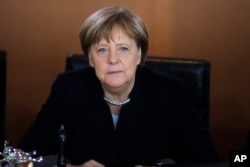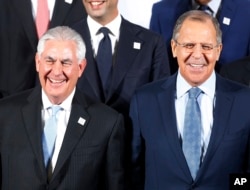U.S. Vice President Mike Pence left Friday morning for Europe, where he will spend the next several days meeting with world leaders in Munich and Brussels.
This will be Pence's first overseas trip since being sworn into office last month.
A senior White House foreign policy adviser says the trip is "an opportunity for the vice president to reassure our allies and our partners and also to lay out our U.S. priorities for the transatlantic relationship on behalf of" President Donald Trump.
European leaders have been concerned about the Trump presidency because of the U.S. president's repeated expressions of admiration for Russian President Vladimir Putin and Trump's description of NATO last month as "obsolete."
“The European concern will not be so much about an isolated America but rather the risks of American unilateralism, and I think that is one of the key points where European leaders will seek reassurance from this administration. Whatever the direction of American policy in the world, that it’s not going to be unilateral and that it will still place value on partnerships in Europe," said Ian Lesser, senior director for foreign and security policy at the GMF research organization.
Trump has voiced his support for more protectionist economic measures. TTIP, the Transatlantic Trade and Investment Partnership is unlikely to be agreed upon between the U.S. and EU, despite years of negotiations.
EU Commissioner for Economic Affairs Pierre Moscovici told journalists earlier this week that the U.S. is the single most important source of uncertainty and that the EU is looking to ensure a spirit of cooperation.
“The Americans remain our partners and our allies," Moscovici noted. "We need to get to know some of the policy orientation they take on banking regulation and corporation on fiscal and banking standards in the context of G20.”
Joser Janning, a senior policy fellow at the European Council of Foreign Affairs said that Europe’s best approach to strengthen ties with the U.S. would be by increasing the continent’s ability to act.
“The Trump factor merely makes the necessary adjustment more urgent. Both in the area of NATO and of the EU, the precondition for partnership with the U.S. can no longer be the inability of Europeans to protect and secure themselves, but their ability to do so," Janning said. "Autonomy has become the essence of partnership, and needs to replace dependence.”
Munich Security Conference speech
Pence will address the Munich Security Conference on Saturday where, the adviser said, Pence is "going to reassure our allies of our commitment to our European partners and the reassurance for the transatlantic alliance."
The adviser said Pence will deliver the message that "we are the most secure and most prosperous when both the U.S. and Europe are strong and united."
Pence is expected to show the U.S. support for NATO, while echoing calls from Trump and Defense Secretary Jim Mattis for other countries to contribute more financially to the partnership.
On Wednesday, Mattis warned NATO ministers that Washington would “moderate its commitment” to the alliance if allies do not commit a minimum of two percent of their GDP to their defense budgets.
“America will meet its responsibilities, but if your nations do not want to see America moderate its commitment to the alliance, each of your capitals needs to show its support for our common defense,” Mattis reportedly told the ministers Wednesday during a closed-door meeting.
Mattis did not say how Washington might alter its commitments to the 28-member alliance.
Trump has, in the past, suggested the United States might not defend NATO allies who did not spend their share on defense.
Meetings with foreign leaders
In Munich, Pence will meet with German Chancellor Angela Merkel and several Eastern European leaders. He also will meet with Afghan President Ashraf Ghani and Iraqi Prime Minister Hiader al-Abadi.
In Brussels, Pence will meet with several European Council and NATO leaders, including European Council President Donald Tusk and NATO Secretary-General Jens Stoltenberg.
Ukrainian Foreign Minister Pavlo Klimkin confirmed with VOA's Ukrainian Service that President Petro Poroshenko also will meet with Pence in Brussels.
Klimkin told VOA that he expected the White House and European allies to continue pressuring Russia over its past aggressions in Ukraine.
"I absolutely expect that the U.S. will play a more proactive role, along with our European partners, in pressuring Russia to fulfill their obligation according to the Minsk agreement," he said.
Russia
U.S. Secretary of State Rex Tillerson met Thursday in Germany with Russian Foreign Minister Sergei Lavrov for the first time, and he left the meeting with expectations that Russia will adhere to the agreement.
"As we search for new common ground, we expect Russia to honor its commitment to the Minsk agreements and work to de-escalate violence in the Ukraine," Tillerson said in Bonn, where foreign ministers of the G-20 nations are meeting.
Under the 2015 Minsk agreement, Ukraine, Russia and Russia-backed separatists agreed to end the crisis in Ukraine, beginning with the withdrawal of heavy weapons.
Marthe Van der Wolf contributed to this report from Brussels







